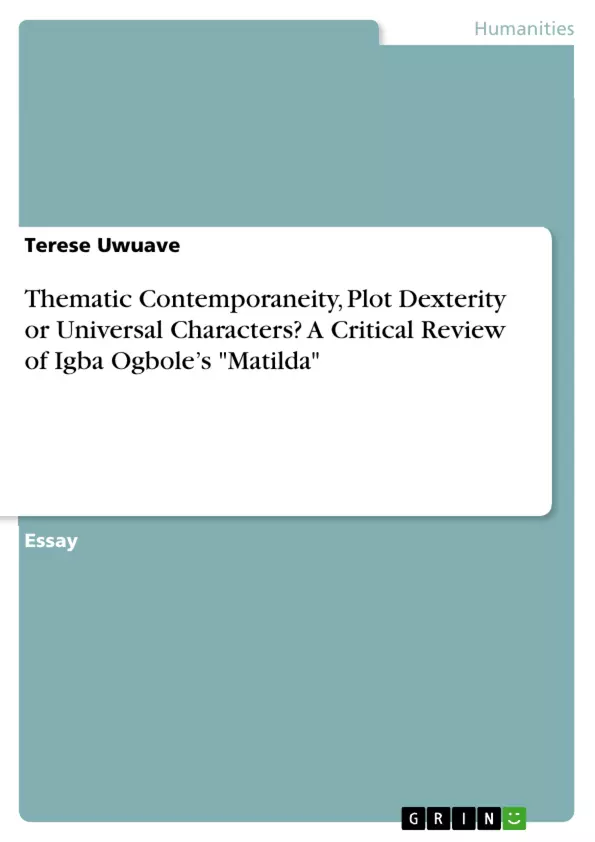This book review is an introduction to Igba Ogbole's latest novel, "Matilda". The review highlights numerous striking features that make the novel one of the unputdownables.
Igba Ogbole’s "Matilda" is a harrowing, yet absorbing and compelling Bildungsroman that chronicles, in a subtle plot, the adverse effects of love and betrayal on the novel’s eponymous protagonist, Matilda. How Matilda rises against these perfidious acts to become a legal luminary in pursuit of justice for the defenseless constitutes an important part of Ogbole’s tale, reflecting the novel’s didacticism and the truism of the extent and limitations of the human will to survive.
The novel is a carefully crafted work that reflects, accurately, the traits of a realistic novel, and specifically, a novel of formation. The title is therefore appropriate as it begins and ends with Matilda. The novel’s opening is gripping and hauntingly full of challenging questions that open up several vistas of speculation in the mind of a curious reader within a short period of time: Who is Lucas Jampa? Is he truly a disaster distributor, as suspected by Ochanya? Who is Ehi? Could she be Matilda?
The artistic dexterity displayed by Ogbole in concealing possible answers to these questions, yet sustaining the interest of readers till the last pages of the novel, marks Matilda as one of the unputdownables.
Table of Contents
- Thematic Contemporaneity, Plot Dexterity or Universal Characters? A Critical Review of Igba Ogbole's Matilda
Objectives and Key Themes
This critical review examines Igba Ogbole's novel, Matilda, with the aim of evaluating its thematic relevance, narrative prowess, and characterization. It explores the novel's ability to captivate readers and its portrayal of contemporary societal issues.
- Thematic Contemporaneity: The novel tackles prevalent social issues like poverty, kidnapping, insurgency, rape, robbery, COVID-19, and cultism.
- Plot Dexterity: The novel employs suspense and flashback techniques to engage readers and create a unique narrative structure.
- Universal Characters: The characters are presented in a manner that allows for easy identification and comparison with individuals from various backgrounds and literary works.
- Realistic Portrayal: The novel's setting and characters contribute to its realistic disposition.
- Moral Didacticism: The novel promotes a message of love and forgiveness, encouraging readers to embrace a Christ-like approach to life.
Chapter Summaries
The novel begins with a gripping opening that introduces the protagonist, Matilda, and her challenging circumstances. The narrative unfolds through a series of events that delve into the complexities of love, betrayal, and the pursuit of justice. The reader is kept engaged through suspenseful plot twists and revelations. The novel explores themes of poverty, kidnapping, insurgency, rape, robbery, COVID-19, and cultism, reflecting contemporary societal ills. The characters are presented realistically, with their actions and motivations relatable to readers. The novel also emphasizes the importance of love, forgiveness, and the pursuit of justice.
Keywords
The main keywords and focus topics of this novel include thematic contemporaneity, plot dexterity, universal characters, realistic portrayal, moral didacticism, love and betrayal, societal ills, suspense, flashback, and character development. These terms reflect the novel's exploration of contemporary issues, its captivating narrative techniques, and its focus on relatable characters and universal themes.
- Quote paper
- Terese Uwuave (Author), 2024, Thematic Contemporaneity, Plot Dexterity or Universal Characters? A Critical Review of Igba Ogbole’s "Matilda", Munich, GRIN Verlag, https://www.grin.com/document/1438390



